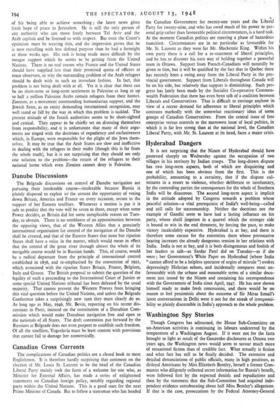Hyderabad Dangers
It is not surprising that the Nizam of Hyderabad should have protested sharply on Wednesday against the occupation of two villages in his territory by Indian troops. The long-drawn dispute has two long-term aspects, both of which are disquieting and one of which has been obvious from the first. This is the probability, amounting to a certainty, that if the dispute cul- minates in a resort to violence, whether deliberate or involuntary, by the contending parties the consequences for the whole of Southern India will be disastrous. The second long-term aspect is implicit in the attiiude adopted by Congress towards a problem whose peaceful solution—a vital prerequisite of India's well-being--called and still calls for statesmanship. Neither the doctrines nor the example of Gandhi seem to have had a lasting influence on his party, whose shrill jingoism in a quarrel which the stronger side is bound to win in the end threatens, by forcing the pace, to make victory incalculably expensive. Hyderabad is at bay, and there is therefore some excuse for the extremists there whose provocative bearing increases the already dangerous tension in her relations with India. India is not at bay, and it is both disingenuous and foolish of her leaders to talk—as Sardar Patel did on Tuesday—as if she were ; her Government's White Paper on Hyderabad (where India "cannot afford to be a helpless spectator of orgies of misrule ") evokes depressingly Hiderian echoes, and incidentally compares most un- favourably with the urbane and reasonable terms of a similar docu- ment just issued by the Nizam and containing his correspondence with the Government of India since April, 1947. He has now shown himself ready to make fresh concessions, and there would be no reason to feel pessimistic about the outcome of Sir Mirza latest conversations in Delhi were it not for the streak of irresponsi- bility so plainly discernible in India's approach to the whole problem.


































 Previous page
Previous page